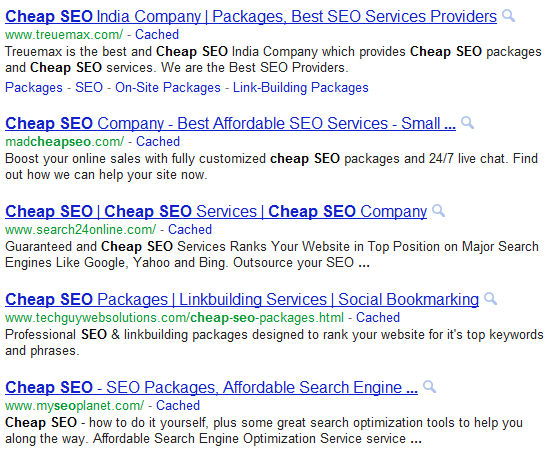We’ve taken a look at some effective AdWords strategies in the past — how to write effective ad copy, what types of lead forms convert well, and the like.
Now I want to show you 4 AdWords “strategies” that I continue to see in clients’ and prospects’ SEM accounts, and debunk them. These are 4 things that AdWords veterans simply don’t do, and now you won’t either.
1) Advertising on peripheral terms. Your bestRead more…
We’ve taken a look at some effective AdWords strategies in the past — how to write effective ad copy, what types of lead forms convert well, and the like.
Now I want to show you 4 AdWords “strategies” that I continue to see in clients’ and prospects’ SEM accounts, and debunk them. These are 4 things that AdWords veterans simply don’t do, and now you won’t either.
1) Advertising on peripheral terms. Your best shot at AdWords ROI is to identify keywords that signify searcher intent to find your site or product, and to tailor your ads to those search terms as closely as you can. It’s tempting to think, “Maybe if I bid on terms related to tax season, like ‘1099’ or ‘find a tax accountant,’ I’ll hook potential customers for my tax software — but don’t go down that road. You’ll find you spent time to set up a campaign only to suffer low quality scores, low clickthrough rates and poor-converting traffic.
2) Let AdWords set your bids. If you’re racking up enough conversion data to use Conversion Optimizer bidding, you’re golden. Manual bidding is cool too. But there’s another option: “AdWords will set my bids to help maximize clicks within my target budget.” This auto-CPC strategy is self-admittedly ineffective unless all you’re trying to do is get unqualified traffic and money (and ROI) is no object.
3) Brand name in your ad copy. With all these impressions, you might get the harebrained idea that search marketing is an opportunity to build some brand awareness. Let me set you straight: in display, that might be true, but in the search network, nobody cares about your company name unless your brand carries some major weight. If you’re using your brand name in AdWords ad headlines, 9 times out of 10 you’re wasting real estate.
4) Copy & paste from AdWords keyword tool. The AdWords keyword tool is a great resource, but if you don’t parse carefully, your adgroups will earn terrible quality scores and even worse ROI. Be sure to use the option to “show search terms closely related to the ones I entered,” and filter down from there. Your objective is to create tightly themed adgroups focused on a specific search intention — not to pull in every possible keyword under the sun.
Now go make sweet AdWords love, you crazy marketers.
...Read less
